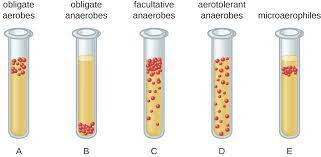Based
on requirement of oxygen for growth, bacteria can be classified into the following
groups.
·
Obligate Aerobes: are strict aerobes. Can
grow only in the presence of oxygen (21%). Eg. Mycobacterium tuberculosis, Pseudomonas aeroginosa
·
Obligate Anaerobes: are strict anaerobes. Grow only
in the complete absence of oxygen. Oxygen presence is toxic and lethal to their
growth. Eg: Clostridium perfringens, Clostridium
boyulinum.
·
Aerotolerant
Anaerobes: Some anaerobic
bacteria can tolerate low levels of oxygen and are called nonstringent or aerotolerant
anaerobes. Oxygen
is actually not required for their growth but not harmful if present.
Eg: Propionibacterium acnes
·
Facultative anaerobes: They can grow well in both
aerobic and anaerobic conditions. They do not require oxygen for growth, but
may use it for energy production if available. e.g., Enterobacteriaceae group, Staphylococcus aureus
·
Microaerophiles: Require low levels of
oxygen for growth. They can neither tolerate normal levels of oxygen in air nor
can live in complete oxygen absence. These
groups of bacteria can grow under reduced oxygen (5% to 10%) and increased
carbon dioxide (8% to 10%) concentration. Eg: Campylobacter jejuni, Helicobacter pylori
Their growth when inoculated into semisolid media is as shown in the diagram.



No comments:
Post a Comment
Note: Only a member of this blog may post a comment.